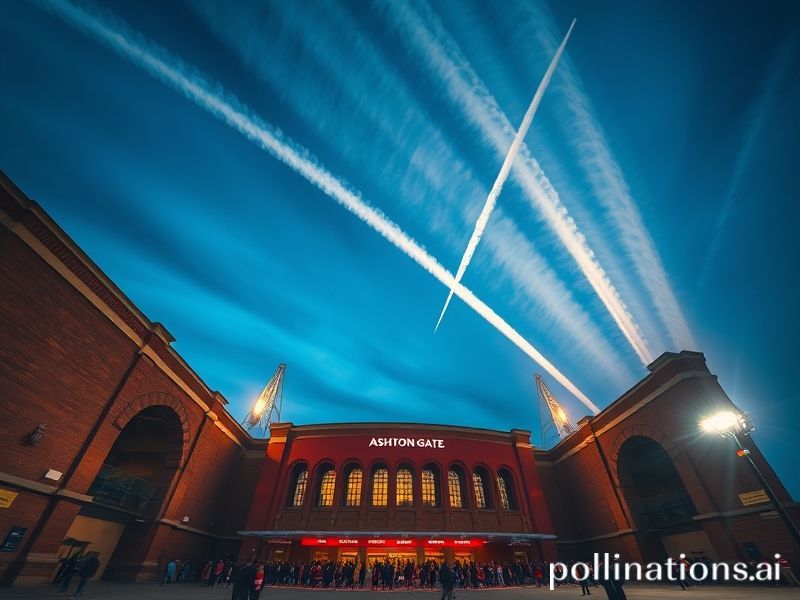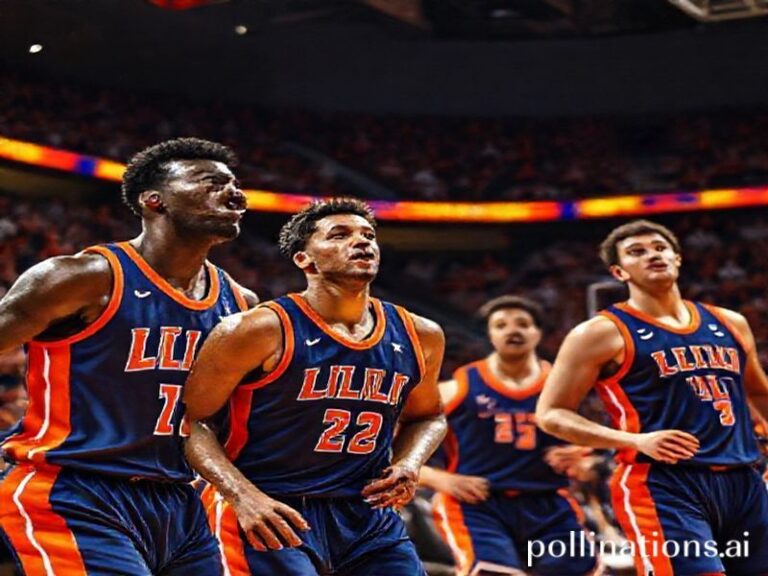Ashton Gate: How a Humble Bristol Stadium Became a Microcosm of Global Absurdity
Ashton Gate: The World Shrinks Around a Patch of Grass in South Bristol
By our correspondent, still pretending the local is global
The first thing you notice when you land at Heathrow—after the queue that makes purgatory look like priority boarding—is that the planet’s problems are now classified as either “over there” or “somebody else’s algorithm.” Yet here we are, writing about Ashton Gate, a 27,000-seat stadium wedged between a Victorian cemetery and a Lidl in South Bristol. Why? Because the world refuses to stay in its lane.
In 1864, when the Empire was busy misplacing entire continents, Ashton Gate was merely a pasture rented from a local dairy farmer so that grown men could chase a bladder of air in front of 200 mildly interested cows. Fast-forward 160 years and the same rectangle of grass is where a Saudi-funded consortium’s latest plaything—Bristol City FC—occasionally kicks a ball while its North American analytics firm calculates “brand uplift” in Jakarta. The past didn’t die; it was just leveraged.
The stadium’s redevelopment, completed in 2016, is a master class in globalized déjà vu: Danish architects, German under-soil heating, Chinese video ribbons, and a gin bar whose botanicals were harvested on a rooftop somewhere that used to be a council estate. The architect bragged that Ashton Gate would become “the beating heart of South Bristol.” He did not mention the cardiac arrest of local ticket prices, which now track the price of Brent crude more closely than they do regional wages.
Meanwhile, the club’s owner—an elusive billionaire whose LinkedIn profile toggles between “venture philanthropist” and “family office”—has floated the idea of a pre-season tour in the United States, “to grow the Robins’ transatlantic footprint.” One pictures a bemused Kansas City family Googling “Bristol” and concluding it must be a suburb of London, much like Nebraska is a suburb of New York. The club’s social-media team has already begun posting memes in Portuguese, apparently on the assumption that the Global South is contractually obliged to adopt an English second-tier side every decade.
The international significance, if you squint, lies in Ashton Gate’s carbon footprint. UEFA recently announced that any club hoping to compete in Europe must submit a sustainability plan that sounds suspiciously like a school essay on “My Summer Holiday” but with more bar charts. Ashton Gate’s answer is a fleet of electric minibuses—built in Poland, charged with French nuclear power, and wrapped in an advert for a crypto exchange domiciled in the Cayman Islands. The club claims this will “offset” 200 tonnes of CO₂ per season, roughly the amount emitted by one midsized influencer’s private jet trip to Dubai. Progress, like a VAR decision, is subjective.
Then there’s the geopolitical subplot. Last year the stadium hosted a “Diplomacy Through Football” summit where ambassadors from 17 nations pretended not to know that Qatar was simultaneously bidding to buy the naming rights. The Qatari delegation arrived with glossy brochures and left with the stadium Wi-Fi password, which is reportedly still “Robins123”. Somewhere in Doha, an intern is updating a spreadsheet labeled “Soft Power Assets, Tier 2.”
And let us not forget the fans. Once the preserve of dockworkers and substitute teachers, the Ashton Gate crowd now includes Californian tech bros on “workcations,” Singaporean students live-streaming to 30,000 followers, and a middle-aged couple from Toronto who think they’re at Anfield. All of them united in the universal ritual of overpaying for undercooked pies while shouting at millionaires who can’t hear them over the Bluetooth in their boots.
In the end, Ashton Gate is a 115-by-74-yard Rorschach test: what you see depends on which passport you wave at immigration. To the locals, it’s the place where grandad once got hit by a stray free kick; to the hedge-fund analyst it’s an “under-utilized urban asset with upside optionality.” The rest of us are left to marvel that the world can squeeze itself onto a patch of grass in South Bristol and still feel bigger than ever.
Conclusion: Whether the final whistle signals promotion, relegation, or merely another lap around the sun, Ashton Gate reminds us that globalization is no longer a process; it’s the pitch we play on. And the score? Always nil-nil, pending review by someone in a timezone you can’t pronounce.







